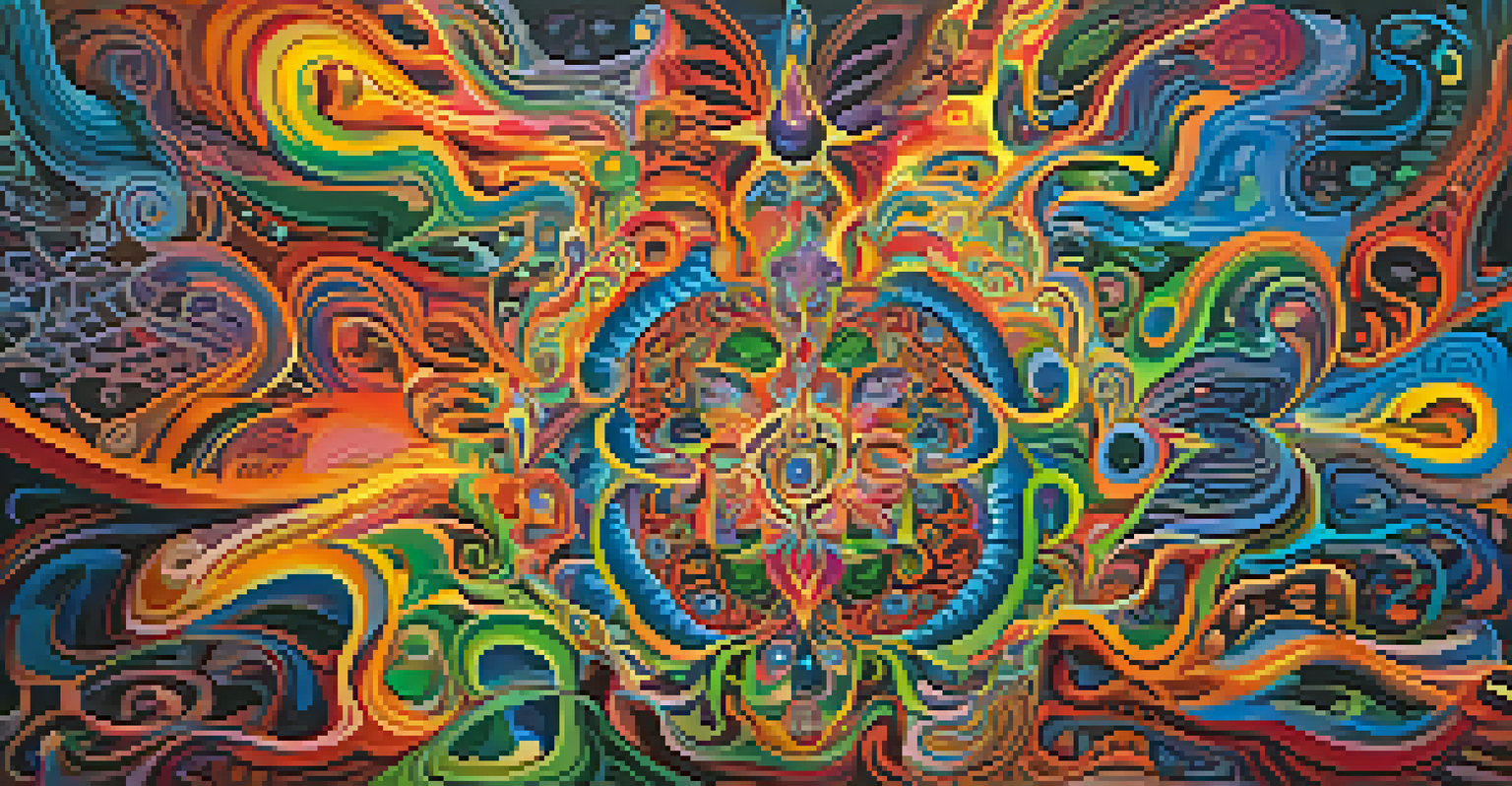The Psychological Impact of Ayahuasca: A Therapist's View

Understanding Ayahuasca: A Brief Overview
Ayahuasca is a traditional Amazonian brew made from the Banisteriopsis caapi vine and the Psychotria viridis leaf. It contains DMT, a powerful hallucinogen that induces altered states of consciousness. For many, this substance serves as a catalyst for profound spiritual and psychological experiences.
The experience of ayahuasca is not just about what you see, but also about what you feel and learn about yourself.
Historically, indigenous cultures have used ayahuasca for healing and spiritual growth. The brew is often consumed in a ceremonial context, guided by experienced shamans who facilitate the journey. This cultural backdrop plays a significant role in shaping the psychological impact it has on individuals.
As interest in ayahuasca grows in Western contexts, more people are seeking it for therapeutic purposes. This has sparked debates about its efficacy and safety, leading therapists to explore its potential benefits and risks within a clinical framework.
The Role of Set and Setting in Ayahuasca Experiences
Set and setting are crucial concepts in psychedelic therapy, referring to the mindset of the individual and the physical environment during the experience. A positive set, characterized by openness and curiosity, can enhance the therapeutic potential of ayahuasca. Conversely, a negative mindset may lead to challenging experiences, often described as 'bad trips.'

The setting, or the environment in which the ayahuasca is consumed, is equally important. Ideally, it should be a safe, supportive space, often facilitated by trained professionals. This environment can help individuals feel secure enough to navigate their psychological journeys.
Ayahuasca's Therapeutic Potential
Emerging research indicates ayahuasca may effectively treat mental health conditions like PTSD, addiction, and depression.
When set and setting align positively, participants often report transformative insights and emotional breakthroughs. This underscores the importance of preparation and guidance in maximizing the therapeutic effects of ayahuasca.
Common Psychological Effects of Ayahuasca
Individuals who partake in ayahuasca often describe a range of psychological effects, including intense emotions, vivid visualizations, and profound introspection. Some report a heightened sense of connectedness to themselves and the universe, fostering feelings of unity and peace. This can be particularly beneficial for those grappling with anxiety or depression.
Psychedelics can show you the truth about yourself and the world. The challenge is to integrate that truth into your everyday life.
However, it's essential to recognize that not all experiences are positive. Some may encounter repressed memories or unresolved trauma, leading to emotional distress during the journey. This complexity highlights the need for professional support before and after the experience.
A therapist's role can be pivotal in helping individuals process these emotions. By providing a safe space for discussion, therapists can assist in integrating the insights gained from the ayahuasca experience into everyday life.
The Therapeutic Potential of Ayahuasca
Emerging research suggests that ayahuasca may have therapeutic benefits for various mental health conditions, including PTSD, addiction, and depression. The brew's unique properties can facilitate significant emotional release and cognitive shifts, allowing individuals to confront and reframe their experiences. This process can lead to lasting changes in perspective and behavior.
In clinical settings, therapists often work to create a structured approach to ayahuasca use. This includes pre-journey preparation and post-journey integration sessions, which foster a comprehensive therapeutic experience. By doing so, therapists can help clients navigate their emotions and insights effectively.
Importance of Set and Setting
The mindset and environment during an ayahuasca experience significantly influence its therapeutic outcomes.
It's important to note that while ayahuasca shows promise, it is not a cure-all. Ongoing research is crucial to understanding its long-term effects and the best practices for safe, therapeutic use.
Risks and Considerations of Ayahuasca Use
Despite its potential benefits, ayahuasca is not without risks. The intense psychological experiences can lead to anxiety, paranoia, or exacerbation of existing mental health issues. It's vital for individuals to evaluate their mental health history before considering ayahuasca, particularly those with a history of psychosis or severe anxiety disorders.
Moreover, the physical effects of ayahuasca can also pose risks, such as nausea and vomiting, which are common during the experience. Understanding these aspects is crucial for anyone considering the brew as a therapeutic option.
Therapists emphasize the importance of a thorough screening process. This helps ensure that individuals are well-informed and prepared, minimizing potential risks while maximizing the therapeutic benefits.
Integration: The Key to Lasting Change
Integration refers to the process of incorporating insights gained from the ayahuasca experience into daily life. This step is crucial for translating temporary revelations into lasting behavioral change. Without proper integration, individuals may struggle to make sense of their experiences, leading to confusion or frustration.
Therapists play a vital role in this integration phase, guiding clients through discussions about their experiences and helping them develop actionable steps. This support can include journaling, mindfulness practices, or ongoing therapy sessions to reinforce the insights gained.
Integration for Lasting Change
Successful integration of insights from ayahuasca experiences is crucial for translating temporary revelations into enduring behavioral change.
Ultimately, successful integration can enhance the overall therapeutic impact of ayahuasca, allowing individuals to harness their experiences for personal growth and healing.
The Future of Ayahuasca in Therapeutic Settings
As interest in ayahuasca continues to rise, the dialogue surrounding its use in clinical settings is evolving. More therapists are exploring its potential benefits and incorporating it into holistic treatment plans. However, this shift also calls for stringent ethical considerations and guidelines to ensure safe practices.
Research into the therapeutic effects of ayahuasca is gaining momentum, with studies highlighting its potential in treating various psychological conditions. As findings emerge, there is hope for more structured and scientifically-backed approaches to its use.

In the future, we may see ayahuasca becoming more widely accepted in therapy, supported by evidence of its benefits and guided by best practices. This evolution could pave the way for more inclusive and effective mental health treatment options.